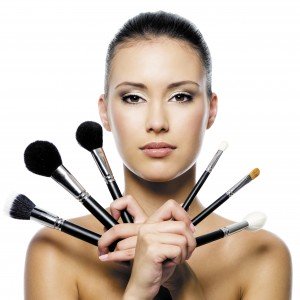How to Keep Cosmetics Clean and Your Skin Clear
 Clare from Elite School of Beauty gives her top tips on how to keep cosmetics clean to avoid acne and skin breakouts.
Clare from Elite School of Beauty gives her top tips on how to keep cosmetics clean to avoid acne and skin breakouts.
Ever have breakouts on your face and not know why? It’s might be down to your make-up. As your cosmetics age, bacteria and mould will set in. Wiping that bad bacteria all over your face when you moisturise, blush and apply could lead to breakouts and even infections. Avoid skincare disasters by sanitising your make-up and keeping your cosmetics clean.
Wash and Dry Your Hands Before Applying Make-up
The first step to preventing bacteria from spreading in your cosmetics is to make sure your hands are clean before you apply your make-up each morning. Make-up can be contaminated by the oils, bacteria and germs that can be found on your skin and hands. It’s important to wash your hands in warm water with soap and dry on a clean towel before applying your make-up, especially if you use your fingers to do so.
Wash Make-up Brushes After Use
After use, wash all of your make-up brushes and applicators. The secret to successfully washing them is to use a mixture that is half water and half baby shampoo. Dip the brushes into the solution and massage the bristles to ensure that they are cleaned all the way through. Rinse the brushes under warm water and lay on a towel to air dry.
Wipe Off the Top Layer of Powder Products
Every time you use blushes, foundation or any other powdered make-up product, you need to wipe off the top layer. Unwanted bacteria can stick onto dry products easily, which means a cleaning routine is really important. Wiping the top layer will get rid of any oils that might have settled there and prevent them from being transferred to your skin.
Don’t Use Mascara that’s More than 6 Weeks Old
I’m sure we’re all guilty of this one, but using old mascara could cause eye infections and sties on your eyelids. Mascara develops bacteria just like all other cosmetics and when you apply it to your eyelashes, you’re spreading the bacteria dangerously close to the eye itself. Better safe than sorry, throw it out after six weeks.
Sanitise All Make-up Products
It’s essential that we all routinely sanitise our make-up products too. Get yourself a little spray bottle and fill it with undiluted rubbing alcohol. Spray the alcohol directly onto make-up a few times and be sure to completely coat the products. The alcohol will dry and evaporate quickly, so it won’t cause any damage to your powders, creams or liquids, but it will ensure that they’re germ-free.
Elite School of Beauty specialise in make up courses in Hertfordshire. If you want to learn more about the art of make-up and how to properly clean your products, Elite School of Beauty’s one or two day make-up courses might be for you.

